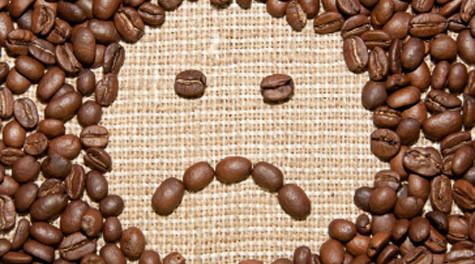13 Reasons to Stop Drinking Coffee

You are perhaps reading this because you or someone close to you is unwell, inflamed, hormonally imbalanced, nutritionally void, overworked, highly stressed, fatigued, depressed and/or toxic. Coffee is not part of the healing process and the statistics and facts from numerous studies regarding coffee is quite compelling.
The toxicity of caffeine becomes apparent when you try to remove the stimulant from your diet. Common side effects include headaches, fatigue, sleepiness, lethargy, irritability, depression, muscle pain and stiffness, but to name a few…
Keeping it simple, drinking coffee has many effects in the body; some good, mostly bad.
 Caffeine, a constituent in coffee, initiates the stress ‘fight or flight’ response , putting our bodies on high alert, ready to take action. This stress response is great if fending off a sabre tooth tiger or wanting to lift a car off and injured pedestrian, not so good sitting at a computer. The stress response also causes the release of cortisol and insulin, causing sugar spikes and the ensuing sugar lows, making you feel lousy.
Caffeine, a constituent in coffee, initiates the stress ‘fight or flight’ response , putting our bodies on high alert, ready to take action. This stress response is great if fending off a sabre tooth tiger or wanting to lift a car off and injured pedestrian, not so good sitting at a computer. The stress response also causes the release of cortisol and insulin, causing sugar spikes and the ensuing sugar lows, making you feel lousy.- Caffeine decreases insulin sensitivity making it difficult for cells to respond to changes in blood sugar. Elevated blood sugar levels cause all sorts of issues, including cardiovascular disease, arterial deterioration, higher levels of triglycerides, LDL’s and VLDL’s (for those who have ever had a cholesterol test these guys are not friends)
- A healthy body has an ideal alkaline blood pH of around 7.3. Coffee is acidic and sits at about pH 5. The acidity of coffee is associated with digestive issues including but not limited to heartburn, halitosis (bad breath) GERD, dysbiosis, ulcers, acid reflux, and bloating.
- Coffee beans are the most chemically treated crop on earth. More than 100 kg of chemical fertilisers are used per acre of coffee being harvested. (organic coffee doesn’t have this problem but most coffee is not organically farmed) and studies have shown more that 1000 chemicals in coffee, not to mention the bleach in the coffee filters, the list goes on….
- Decaffeinated coffee is even worse that regular coffee, and more acidic. Most decaffeinated coffee is processed with methylene chloride and formaldehyde, both known carcinogens.
- Other constituents in coffee can interfere with normal drug metabolism and detoxification in the liver, increasing the load of the liver’s daily function. Liver enzymes are used to break down the constituents in coffee and if the demand is high, the liver becomes sluggish as the major organ of elimination cannot cope.
- Coffee plays havoc with your neuroendocrine system, which encompasses the central nervous system, immune system and hormones. We all know when we are highly stressed we often get sick, – it’s because all systems are intrinsically linked and every action has many knock on effects in seemingly unrelated areas.
- Caffeine elevates serotonin ‘the happy hormone’. Serotonin is integral in mood and appetite regulation, which explains the mood enhancing properties of coffee. it also explains why people get crabby when it is withdrawn, as serotonin levels in the short-term drop as your body has to relearn to release serotonin without coffee as the stimulus. Your body quickly adjusts to releasing serotonin without the stimulus and it’s a fabulous feeling being ‘naturally high’.
- GABA, a neurotransmitter that plays a major role in the Central Nervous System, causes relaxation and sleep. GABA is inhibited when coffee is ingested, causing alertness. Many coffee drinkers are often wired, overstimulated and have trouble sleeping due to the inhibition of GABA.
- High caffeine intake also places excess load on your adrenal glands. Adrenal glands primarily produce adrenaline, a hormone used to regulate stress, as well as suppressing inflammation and regulating blood pressure. We have all heard the term adrenal burnout or adrenal exhaustion, common in those overworked and under extreme levels of stress.
- Drinking coffee adds to the equation by causing more stimulus in an already overstimulated and exhausted system. When a person is under stress, their ability to detoxify even a little caffeine diminishes, which is especially problematic in women who generally have a harder time processing and detoxifying caffeine than men.
- Caffeine diminishes the body’s ability to absorb vitamins, minerals and other essential nutrients it requires for many of the complex processes it performs. Caffeine can diminish the absorption of iron by up to 50% and decrease the uptake and absorption of water-soluble B vitamins too.
- Daily coffee consumption increases insulin resistance. Insulin helps the body transport glucose into the cells however if the cells are less receptive, the job is not being performed effectively. Coupled with a typical western diet high in processed sugars and refined carbohydrates, which means more circulating glucose, the need for higher insulin requirements increases and so the vicious cycle begins. Add stress to the mix and some more stimulants including coffee and you have the potential recipe for a metabolic meltdown.
It’s a wise and fruitful experiment to provide yourself a break from coffee and experience what it feels like to live your life on your own fuel. Your body is an amazing machine and can produce wondrous effects if you give it a chance. See for yourself how fantastically energised, clear-headed and ‘naturally high’ you feel with a cleaner, less chemically fuelled body.



